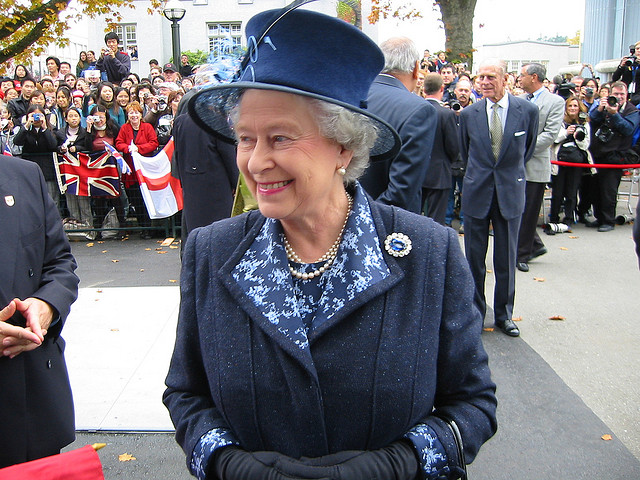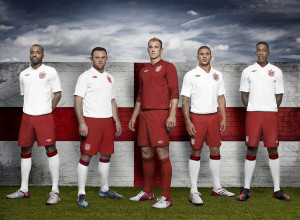Why does the England football manager insist his players sing the national anthem at the World Cup?
Democratic Audit this week featured responses from democracy experts to the news that the England football manager Roy Hodgson will force players to sing the national anthem at the forthcoming World Cup. In this post, Gabriella Elgenius reflects on the history and meanings of national anthems and the particular controversies surrounding God Save the Queen.

Queen Elizabeth II: will England wish her happy, glorious, and long to reign over us? Credit: Michael Chu, CC BY-NC-ND 2.0
In order to answer this question we need to explore deep-rooted understandings of nations and their links to symbols such as national anthems and national flags, the use of which is often even regulated by law as if to protect the nation (and its rulers) from harm or protest. Singing national anthems, waving flags and participating in various national ceremonies authenticates, raises and enforces national boundaries and creates an illusion of unity and sameness. In the current political climate of competing strands of nationalist rhetoric it is also clear that the ‘nation’ – represented by anthems, flags, celebration or commemoration – has re-emerged in full battledress and is (ab)used in a number of socio-political contexts and debates.
The England manager, Roy Hodgson, wants his players to sing the national anthem at the World Cup, as singing before a game has become associated with showing pride in one’s nation. Hodgson is attempting to control the perception of his team as being proud of England, which is central to a game that relies on nationalist fervour. Not singing the national anthem would blur the boundaries towards other teams and other nations and undermine the nature of a nationalist sport.
It is significant to ask if there is anything controversial about God Save the Queen that could deter people from signing it, player or not? The anthem started out as God Save the King and constitutes, together with the revolutionary French Marseillaise, one of two prototypes that subsequently inspired many other anthems in Europe. God Save the King was first performed in 1745 in support of King George II after the claimant to the throne – Prince Charles Edward Stuart (the Young Pretender) – had defeated his army near Edinburgh. God Save the King may have sounded reasonable in this context, although the uprising of 1745 was ultimately unsuccessful. It was named National Anthem after 1825.
The anthem is a soothing piece of music with a singular message. Its warlike origin, its references to the monarchy as a supra-national symbol of Britain, its Christian and religious references will not suit everyone in allegedly inclusive, secular and democratic times. God Save the Queen is not the only anthem in Europe that faces difficulties with some of its lyrics. The lyrics of one of the more controversial verses (no longer quoted on the official webpage of the British Monarchy) read:
“O Lord our God arise, scatter (his) her enemies, and make them fall: confound their politics, frustrate their knavish tricks, on Thee our hopes we fix: God save us all.”
The Marseillaise calls with similar fervour:
“To arms, oh citizens! Form up in serried ranks! March on, march on, may their impure blood flow in our fields.”
The warlike original context of God Save the Queen aside, a national anthem of Britain with supra-national claims doesn’t sit entirely comfortably with the marked rise of Scottish and Welsh identities or with the marked rise of English identity in recent decades. An anthem with supra-national ambitions, in such context, is likely to generate debate as a sample of a dominant narrative and the official national history.
Much has been written about the decline of its counterpart ‘British identity’. Having said this, national anthems are seldom changed as over time, as empty vessels, they come to contain multifaceted meanings of nationhood, are to a degree drained of original meaning and obtain a ‘sacred’ status. When Giscard d’Estaing (President of the French Republic 1974-1981) suggested the Marseillaise ought to be played at a slower tempo (for greater solemnity) this caused a storm of protest. Sex Pistols’ interpretation of God Save the Queen in 1977 divided the nation, the BBC banned it and some in the tabloid press called it treason and for the band’s ‘public hanging’.
There are many dimensions to factor into a response about reasons as to why the players are asked to sing God Save the Queen at the World Cup, and it is not surprising that they are being encouraged to do so. Singing is seen as a demonstration of loyalty, unity and belonging and as a way of installing pride that carry over into the game. What can be said about encouraging nationalist symbols and practices – such as singing anthems – is that as soon as they are regulated or enforced, they are simultaneously turned into powerful counter-instruments and double-edged political tools of protest.
Democratic Audit has featured a series of posts this week on England and the national anthem with a range of expert views. To view other posts click here.
—
Note: This post represents the views of the author and does not give the position of Democratic Audit or the LSE. Please read our comments policy before responding.
—
Gabriella Elgenius is a Sociologist at Nuffield College Department of Sociology, University of Oxford and the Centre for Migration and Diaspora Studies, SOAS. She is is the author of Symbols of Nations and Nationalism: Celebrating Nationhood (Palgrave Macmillan, 2011) and co-editor of Building National Museums in Europe 1750 – 2010: Identity Politics, the Uses of the Past and the European Citizen (Linköping University Press, 2011). Related publications include: Heath, A., Martin, J. and Elgenius, G., 2007. ‘Who do we think we are? The decline of traditional social identities’. In Park et al. eds., British Social Attitudes: the 23rd Report – Perspectives on a changing society. London: Sage for the National Centre for Social Research (NatCen).
is a Sociologist at Nuffield College Department of Sociology, University of Oxford and the Centre for Migration and Diaspora Studies, SOAS. She is is the author of Symbols of Nations and Nationalism: Celebrating Nationhood (Palgrave Macmillan, 2011) and co-editor of Building National Museums in Europe 1750 – 2010: Identity Politics, the Uses of the Past and the European Citizen (Linköping University Press, 2011). Related publications include: Heath, A., Martin, J. and Elgenius, G., 2007. ‘Who do we think we are? The decline of traditional social identities’. In Park et al. eds., British Social Attitudes: the 23rd Report – Perspectives on a changing society. London: Sage for the National Centre for Social Research (NatCen).






 Democratic Audit's core funding is provided by the Joseph Rowntree Charitable Trust. Additional funding is provided by the London School of Economics.
Democratic Audit's core funding is provided by the Joseph Rowntree Charitable Trust. Additional funding is provided by the London School of Economics.
Gabriella Elgenius on the history and meanings of ‘God Save the Queen’ (required reading for Roy Hodgson) https://t.co/DESpWPSTCA
RT @LSEPubAffairs: Why does the England football manager insist his players sing the national anthem @ the World Cup? https://t.co/QqLWMap8uE
Why does the England football manager insist his players sing the national anthem at the World Cup? https://t.co/BRQrm4kS4D
Says the English press – which has a nasty streak of jingoism appealing to a similar streak in some of its readership. I can image that the more cerebral players (there must be some) find such jingoism acutely uncomfortable and compulsory singing may have the reverse effect to that intended. Perhaps we should just purge all cerebral players from the National Team.
The “National” Team being “England” is possibly a bigger anachronism. Most “countries” have national teams that match the nation, with a few exceptions such as:
the UK as England, Wales and Scotland (Rugby Union, Association Football, Commonwealth Games),
the UK as “England and its principality Wales” and Scotland (Cricket),
then collectives:
Ireland as “All Ireland” (Rugby Union, Cricket) and
West Indies (Cricket)
That said, I agree that if England is to have “national teams” we should have our own anthem and not borrow one from a bigger entity. It could be played without words (like Spain and a few other countries), which gets rid of the issue of problematic, non-inclusive or painfully politically correct lyrics.
My own preferences:
English Anthem – Jerusalem (without Lyrics)
“Royal Anthem” – God Save the Queen played as a salute (without lyrics) to the Head of State – as in many countries irrespective of their type of head of state.
UK Anthem (or what is left of it) – The Hymn tune Thaxted (without lyrics) – better know as Jupiter from Holst’s The Planets suite or “I vow to thee my country”
Jerusalem and Thaxted are both good stirring tunes that would rival Land of My Fathers, Flower of Scotland, Ireland’s Call, La Marseillaise, and Il Canto degli Italiani.
Why does the England football manager insist his players sing the national anthem at the World Cup? https://t.co/lSauzOvGpM
Gabriella Elgenius of @SOAS on Roy Hodgson, the #WorldCup and the meaning of ‘God Save the Queen’. https://t.co/WL7522W1A5